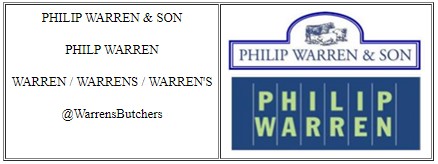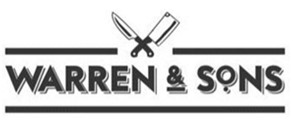Locations
In Philip Warren & Son Limited v Lidl Great Britain Limited and others (2021) EWHC 1097 (Ch) the UK High Court has rejected Philip Warren's claim for passing off against Lidl in relation to Lidl's use of the WARREN & SONS logo.
Background
| Claimant's Marks | Defendant's Mark |
 |
 |
The Claimant, Philip Warren & Son Limited, is a family butcher based in Launceston, Cornwall which has traded for some time at the high-end of the local retail and wholesale market under the marks above left, in particular the blue and yellow logo mark. By 2020 the Claimant's turnover was over £7 million. Its customers included Le Gavroche, Claridge's and Harrods.
By 2015 when the Defendant started using the mark WARREN & SONS, mostly in the form above right, in relation to meat products, the Claimant had both a significant local trade based around Launceston and a significant wholesale business through which it supplied leading restaurants and some prominent outlets in London and elsewhere. The Defendant's products were sold throughout the country in significant quantities between 2015 and 2020.
The judge stated that the Claimant "is very high-end with some less expensive products. Lidl is rather inexpensive with a few high-end products".
The Claimant alleged that use by the Defendant of the mark WARREN & SONS was passing off. By the time the action commenced in 2020, Lidl had decided to rebrand its WARREN & SONS products to create a more uniform house brand and it also surrendered the registered trade mark WARREN & SONS it had obtained. The claim therefore centred not on an injunction to prevent future sales but on damages. Because of the delay in bringing the action, there was approximately 5 years of sales side-by-side. The Claimant produced some limited evidence of confusion.
The Decision
The judge reiterated that every passing off case turns on its own facts and that a court has to determine in each case the extent of the goodwill and whether the defendant's acts are likely to damage. Limited use can be sufficient to generate goodwill for a passing off action. Mere confusion not leading to a sale is not sufficient. However he emphasised that even if this is sufficient, there may not be misrepresentation.
The judge looked at the different categories of the Claimant's customers as follows:
Wholesale customers
Although the judge found that the Claimant had a substantial goodwill in the wholesale trade focused on restaurants and high-end establishments by 2015, it was highly unlikely that the Defendant's sale of WARREN & SONS branded meat was a misrepresentation for a significant number of those in the wholesale trade. There was no evidence of this.
Local retail customers
There was no dispute between the parties that the Claimant had goodwill locally in 2015 as a retailer of high-end meats. The judge found, however, that although the respective marks had considerable similarities, they were in each case largely presented to the public in a logo form which were in his view "very different". The WARREN & SONS branding was not inherently deceptive.
He also stated that the type of product and the end of the market at which it was sold were very different and there was unlikely to be a large overlap of customers. Despite what he thought would have been very large quantities of WARREN & SONS branded meats being sold locally, no examples of confusion had been found in the local Launceston Lidl (less than a mile from the Claimant's flagship store) and none of the Claimant's customers had raised a complaint with Lidl, objecting to them selling the product.
Non-local retail customers
The judge found that in 2015 there was very limited goodwill outside Launceston and the surrounding area and it was unlikely there would be any "material degree of operative misrepresentation" by the sale by Lidl of their products.
The judge concluded that whilst the Claimant had considerable goodwill in its mark particularly in Launceston and the surrounding area and in the high-end wholesale trade and not withstanding similarities in the marks, Lidl's sale of meats under the WARREN & SONS brand did not constitute passing off as there was insufficient evidence of a significant level of misrepresentation to any category of the Claimant's customers.
Damages
The Claimant requested substantial damages based on a royalty of the Defendant's profits or an account of profits. The original claim in the letter before action was approximately £47 million. The judge said, even if there had been damage sufficient to establish liability in passing off, he thought it "implausible" that this could have translated into damages or an account of profits on anything like the scale requested by the Claimant. Although user damages may be a normal remedy in passing off cases, this did not automatically entitle a Claimant to a share in the profit from all sales by the Defendant wherever those sales were made, including in places where and to people who had never heard of the Claimant's mark or business. He also did not believe that any finding of liability would have resulted in the Claimant losing the ability to expand its business.
Delay
The Claimant had received the first of a number of communications that customers may be confused in 2015. It did not believe at that stage it could do anything about this. It was advised by lawyers in 2017 that it might have a claim for passing off. There was further delay before the Claimant entered into a damages- based agreement to protect it. The letter before action was sent in late 2019. However the four and a half years before the claim was brought was not so long as to bar a discretionary remedy such as an injunction. The reasons given by the Claimant for the delay were sufficient.
Comment
The case is a reminder that in a successful passing off action, evidence of reputation is not sufficient. Misrepresentation must be established. In this case, the respective branded products had both been on sale for five years and there was very limited evidence of confusion. Given the level of sales, more evidence of misrepresentation should have been provided by the Claimant. Whilst it achieved its commercial objective of the Defendant stopping using the mark (although not as a result of this court action) it failed in its claim for financial compensation. The period of time during which the Defendant's products were sold, the high volume of sales by the Defendant and the limited number of examples of actual confusion counted against the Claimant in this case.
